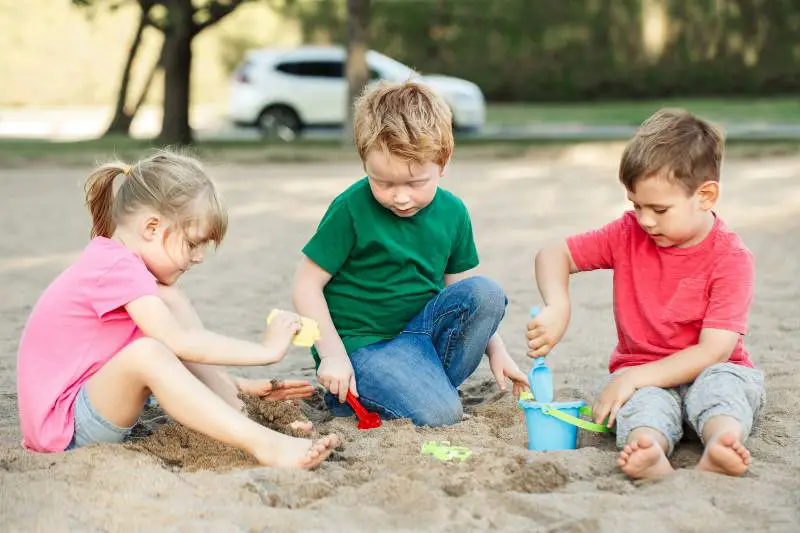Your kids will be happy if you bring them outside more often. Spending time outdoors isn’t just a way to help them burn off energy. It’s also important for their physical and mental development.
Here are 16 benefits that outdoor activities offer to kids.
1. Vitamin D
Soaking up the sun does more than just brighten their day. When your kids play outside, their bodies create Vitamin D from direct sunlight.
Vitamin D is an essential nutrient, which plays a critical role in bone health and has been linked to lower risks of heart disease, diabetes, and even certain forms of cancer.
However, you need to balance sun exposure to prevent skin damage. A splash of sunscreen and timing outdoor (don’t play during peak sun hours) can ensure they get their Vitamin D safely.
2. Physical Benefits
Outdoors is the perfect playground for children. Activities like running, jumping, climbing, and cycling are more than just fun. They are needed for developing strong muscles, bones, and good heart health.
Regular outdoor play helps kids maintain a healthy weight and sets the groundwork for a lifestyle of fitness and well-being.
3. Reduce Stress
Nature has a profound calming effect on both adults and children alike. The simplicity and tranquility of outdoor environments can significantly reduce stress levels in kids.
Activities like walking through a forest, playing in a park, or simply lying in the grass can lower cortisol levels, the body’s stress hormone, promoting a feeling of peace and relaxation.
4. Boost Mood
Regular outdoor activity contributes to improved mood and happiness in children. The combination of physical exercise, exposure to sunlight, and the joy of exploration stimulates the production of endorphins, the body’s natural mood elevators.
Children who spend more time outdoors tend to be happier, more optimistic, and exhibit a lower incidence of emotional disturbances
5. Increase Mental Health
Time spent in nature can significantly boost your child’s mental health. The sights, sounds, and smells of the outdoors stimulate their brain in unique ways.
This engagement with the natural world has been connected to lowered levels of stress and reduced symptoms of anxiety and depression in children.
Moreover, the simple act of playing outside can enhance mood and improve overall emotional well-being. It’s a refreshing break from the pressures and routine of indoor life, offering kids a sense of freedom and adventure.
6. Connection to Nature
Fostering a deep connection with nature from a young age can instill a lifelong appreciation for the environment in your kids. Outdoor activities such as hiking, gardening, and bird watching encourage curiosity about wildlife and ecosystems.
Such a connection not only teaches them about the intricacies of life on Earth but also the importance of conservation and sustainable living practices.
7. Be Active
Being active isn’t just about physical movements; it’s also about engaging with the world in meaningful ways. The outdoors offers endless opportunities for kids to explore, learn new skills, and challenge themselves.
Whether it’s a team sport, a solo adventure, or a family activity, outdoor play is crucial for developing a sense of agency and self-efficacy in children.
8. Decrease Screen Time
In today’s digital world, kids are spending more time in front of screens than ever before. Encouraging outdoor is an effective way to decrease screen time and its associated downsides, such as eye strain, poor posture, and reduced attention span.
Outdoor time offers a break from the digital world and provides several stimulations that screens simply cannot replicate.
9. Improve Focus
Children who spend time outdoors tend to have better focus and concentration. Nature’s inherent stimulation can help reset attention spans, allowing kids to concentrate better when they return indoors.
This improved focus can translate into better performance in school and other activities that require sustained attention.
10. Build Confidence
Outdoor activities provide unique challenges that indoor environments can’t offer. By overcoming these obstacles, whether it’s climbing a tall tree or learning to ride a bike, children build confidence and resilience.
Each new accomplishment boosts their self-esteem and encourages them to tackle even more significant challenges.
11. Boost Creativity
The unstructured nature of outdoor play sparks creativity and imagination. Kids are free to invent games, solve problems, and interact with their environment in inventive ways. The freedom to think outside the box is important for cognitive development and fosters innovative thinking that can benefit them in all areas of life.
12. Improve Immune System
Playing outdoors isn’t just fun; it’s also beneficial for your kids’ immune systems. Exposure to the diverse environments and natural elements outside plays a crucial role in building stronger immunity.
The variety of microbes and allergens encountered in outdoor settings can help reduce the likelihood of allergies and autoimmune diseases. Additionally, physical activities and exposure to sunlight can bolster their body’s defense mechanisms, making them better equipped to ward off illnesses.
13. Develop Social Relationships with Other Kids
Social skills are an integral part of childhood development, and outdoor play offers abundant opportunities for social interaction.
Playing outside often involves group activities, such as sports, games, or simply exploring together, which encourages cooperation, communication, and negotiation among peers.
These interactions help children learn how to work in teams, develop empathy, and understand social cues. The friendships formed on the playground or during outdoor adventures can also provide emotional support and contribute to a sense of belonging.
14. Be Independence
Outdoor activities provide children with the opportunity to exercise independence within a controlled environment. Tasks such as navigating a hiking trail, making a fort, or climbing a tree require children to make decisions, solve problems, and take risks on their own.
These experiences help kids learn about their abilities and limitations, fostering self-reliance and decision-making skills. By encouraging your children to take on challenges and make choices outdoors, you are helping them build an independent spirit that will serve them well throughout their lives.
15. Improve Sensory Skills
The outdoors is a sensory-rich environment where children can see, hear, smell, touch, and even taste nature. Engaging with the natural world in this way enhances sensory development, which is critical for cognitive growth.
Sensory play helps refine motor skills, improves hand-eye coordination, and builds neural connections in the brain associated with learning and memory.
For instance, the tactile experience of building with sand, the auditory input from birdsong, or the visual stimulation from the myriad colors of a garden—all contribute to a child’s sensory education.
16. Improve Sleep
Finally, one of the most significant benefits of spending time outdoors is improved sleep quality. Physical activity and exposure to natural light help regulate children’s natural sleep cycles, also known as circadian rhythms.
Engaging in outdoor activities, especially in the morning or early afternoon, can increase the duration and quality of nighttime sleep. A good night’s sleep ensures that children are refreshed and ready for the day ahead, be it for school, play, or more outdoor adventures.
Conclusion
As you can see, there are several benefits of bringing your kids to spend time outdoors.
Finding ways to include outdoor activities in your child’s routine can make a significant difference. You can plan family outings, encourage them to join outdoor clubs, or simply let them explore your backyard.
The key is to make it fun and engaging, showing them that the natural world is full of wonders waiting to be discovered.





